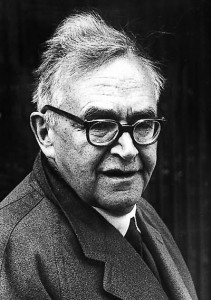“Missional” has been a buzzword in evangelicalism for a number of years now. It’s been the safer alternative to “emergent.” People from pretty much any evangelical perspective — and beyond — can gather around the notion that God is a “missionary God” and that a primary–if not the primary–purpose of the church is to witness to and serve those outside the church, with a special focus on immediate and surrounding neighborhoods. Missional churches seek to be driven by the specific “DNA” of the locality in which they find themselves. They pay close attention to the socio-cultural contexts in which they minister, orienting their activities, their values, and their vision around what they take to be God’s redemptive purposes in those contexts.
Karl Barth, the eminent Protestant theologian, was a major influence on the origin of this movement. A lecture he gave to a missionary conference in 1932 became a touch-stone for the twentieth-century turn to “missional.” He spoke there of the “actio Dei” (a phrase which eventually morphed — by others — into the Missio Dei–now a motto of the missional church movement. For Barth, God is a God whose being is in becoming. God acts; his action involves a sending. The Father sends the Son and the Spirit into the world to en-act the reconciliation of God with humanity, grounded in God’s freedom to elect humanity for salvation in Jesus Christ. Similarly, but derivatively, the church has been “sent” by God into the world as witnesses to God’s reconciliation.
missionary conference in 1932 became a touch-stone for the twentieth-century turn to “missional.” He spoke there of the “actio Dei” (a phrase which eventually morphed — by others — into the Missio Dei–now a motto of the missional church movement. For Barth, God is a God whose being is in becoming. God acts; his action involves a sending. The Father sends the Son and the Spirit into the world to en-act the reconciliation of God with humanity, grounded in God’s freedom to elect humanity for salvation in Jesus Christ. Similarly, but derivatively, the church has been “sent” by God into the world as witnesses to God’s reconciliation.
In his interesting essay, “The Church in Karl Barth and Evangelicalism: Conversations Across the Aisle,” Kimlyn Bender argues that Barth united the doctrine of salvation, the mission of the church, and the significance of the wider culture (world) into a holistic theology of the gospel. Salvation cannot be sharply distinguished from the creation of and the mission of the church. The church does not exist as its own end, but as a (flawed) means to a greater, wider purpose in God’s reconcilation with the world.
Paul Chung, in Reclaiming Mission as Constructive Theology, details the origin of the modern missional theology movement in Barth’s trinitarian theology. He gives a tip o’ the hat to Christoph Blumhardt’s influence on Barth’s fully-orbed understanding of the gospel as necessitating outward, social witness. The social outworking is grounded in Barth’s trinitarian theology of mission, which “becomes more holistic, dynamic, and socially and critically engaged in the public sphere” (109).
In short, Barth’s deep theology of the church (which upholds the significance of the church, but in a relativized way since it is subservient to and in service of the Kingdom of God), has a unique ability to provide the church with a deep theological rationale, not only for its missional activity, but for its continued existence.
Reading about the origin of the modern movement in the theology of Barth — and theological missiologists — makes me wonder how much of the missional church / missional theology movement is currently grounded in a deep theology? How pervasive, within the movement, is a reflective (and critical) theological articulation of the church’s existence–in relation to the trinitarian God and to the fully-orbed nature of the Gospel? I don’t know the answer to this, but it does seem that “missional church” could easily become a catch-phrase which works well for marketing, but would not have much staying power if it is not grounded in a deep theological perspective.
I’d be interested in hearing from those of you who are involved in “missional” churches. How theological is the missional church?











